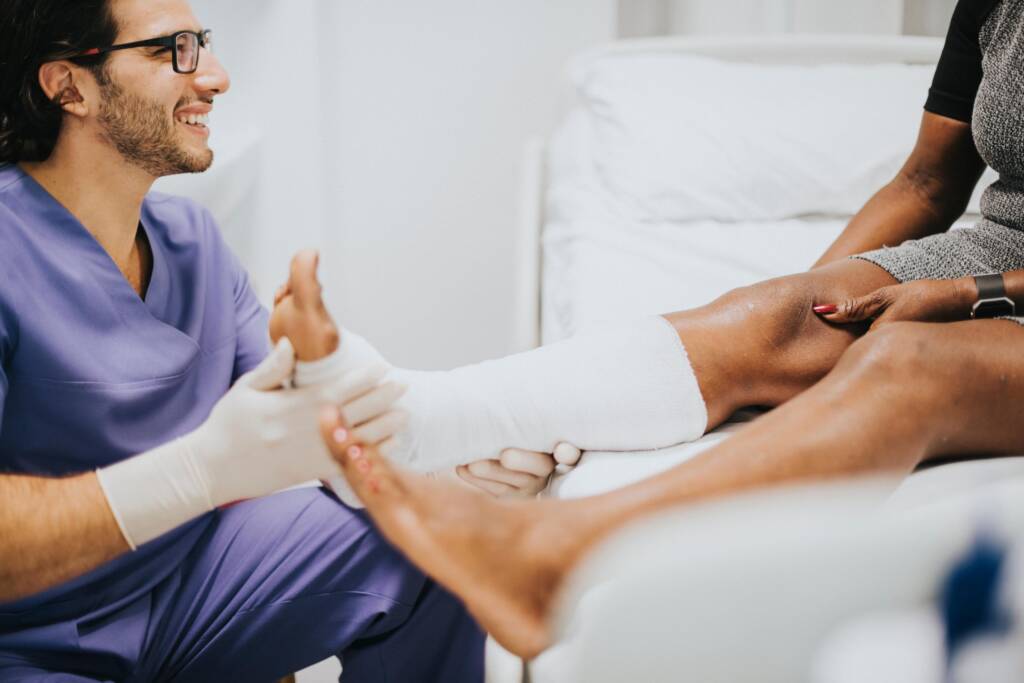Specialty Spotlight: What is an Orthopedic Doctor?
There are many ways a person can get injured, but most injuries involve damage to the joints, bones, ligaments, nerves, and tendons, which are all part of the musculoskeletal system. An orthopedic doctor is one who treats this system and injuries to it. This specialty sees people of most age groups and activity levels, and orthopedic doctors are in high demand. Here is a closer look at this specialty and how you can become one.
What is an Orthopedic Doctor?
Strictly speaking, an orthopedic doctor is a medical specialist who is trained to diagnose and treat problems of the musculoskeletal system. In addition to their medical school training, they, like other medical specialties, receive training specific to this system. Most general practitioner doctors will refer their patients to orthopedic doctors when they’re injured or having problems with the joints, bones, and connective tissue.
According to the Bureau of Labor Statistics, orthopedic doctors who are also orthopedic surgeons make an annual wage of over $350,000 a year. This can be a lucrative practice area, especially if you’re willing to take on surgical training, and one that’s in high demand.
What Does an Orthopedic Doctor Do?
Rather than asking, “What is an orthopedic doctor,” a better question may be, “What does an orthopedic doctor do?” Looking at the specific roles of this medical specialty will help pre-med students decide if it’s the area of study they want to pursue. Here are some specific roles of these doctors:
Treating Sports Injuries
If someone suffers an injury during physical activity or sports, they typically get diagnosed and treated by an orthopedic doctor. These doctors understand the mechanics of how these injuries occur, and they also understand what is necessary to get the affected body part back to its normal function.
Treating Degenerative Conditions
Some conditions of the musculoskeletal system are degenerative in nature. For example, arthritis and osteoporosis tend to get worse over time as a person ages. These degenerative conditions may not have cures, but orthopedic doctors can provide help with symptom relief. They can also suggest exercises, supports, and lifestyle changes that can slow the progression of these diseases, helping to preserve the quality of life and the mobility of their patients.
Treating Overuse Injuries
Overuse injuries, like tendonitis and carpal tunnel syndrome, occur when someone does repetitive motions with a joint or muscle. Orthopedic doctors will treat these conditions when they develop. However, they can also help people who do repetitive motions at their jobs learn techniques to avoid injuries before they happen.
What Parts of the Body do Orthopedic Doctors Treat?
Orthopedic doctors focus their work on muscles, bones, and joints. Specifically, they can treat injuries and conditions affecting these body parts:
- Back
- Neck
- Hips
- Knees
- Shoulders
- Elbows
- Feet and ankles
- Hands and wrists
In addition, some orthopedic doctors choose to get additional training to specialize in one particular area of the body, delivering targeted care to that joint or system rather than working with all of them.
Do Orthopedic Doctors Perform Surgery?
Most orthopedic doctors prescribe non-surgical treatments for their patients, such as rest for a period of time or the use of physical therapy. They also are trained to prescribe medications or use injections to get the body part back in functional shape. Lifestyle changes are also common.
Some types of orthopedic injuries do require surgery, at least at the beginning. For this, patients see an orthopedic surgeon. Not all orthopedic doctors receive surgical training.
Where Do Orthopedic Doctors Work?
Orthopedic doctors can work in clinics on their own as an independent practitioner or as part of a larger specialty clinic and practice, or they can be employed by hospital systems and work in an acute care setting. Injury centers often need orthopedic doctors who specialize in injury treatment and prevention. Walk-in clinics that offer injury treatments may also employ orthopedic doctors. Regardless of where they work, orthopedic doctors spend their days diagnosing and treating patients in their clinics or hospitals. They will read X-rays, perform diagnostic exercises, and visually assess the injured area to diagnose the condition or injury.
Is Orthopedic Medicine the Right Specialty for You?
If the thought of helping people with pain and mobility issues sounds appealing, and you want to be working in a field that’s in high demand, then pursuing a specialty in orthopedics could be a good fit. In addition, this field has many opportunities for those who don’t want to perform surgeries, making it a good option for pre-med students who aren’t interested in pursuing surgical training.
One of the best ways to determine which specialty is right for you is with the right mentor. Advanced eClinical Training offers mentorship through pre-med student advisors who can help you weigh your strengths and interests against the various medical specialties out there. As you plan your future in medicine, working with an advisor can help you streamline your education and interests to reach the right people.
If you’re curious to learn more about orthopedic medicine or other specialties, Advanced eClinical Training and our advisors can help. Explore now to get professional guidance for your medical school journey.



